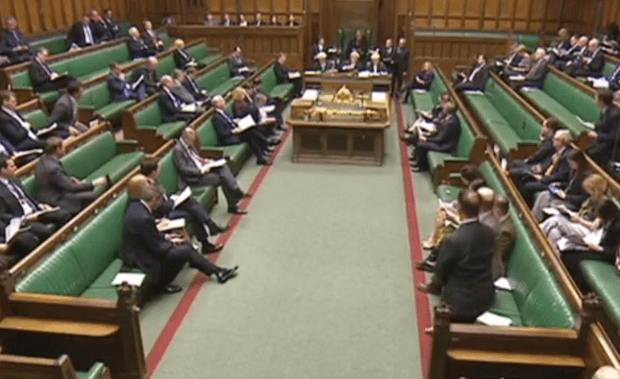Emily Thornberry might not know why Jeremy Corbyn made her Shadow Defence Secretary, but she will have known that this afternoon’s departmental questions for the Ministry of Defence was going to be a difficult session. She came armed with two questions that she knew few would listen to, and delivered them well. But for the rest of the session, she had to listen to MPs on all sides of the Commons attacking not the government of the day, but the policy of the Opposition party. In fact, the government was barely scrutinised at all today, so intense was the focus on Labour and its potential U-turn on Trident.
Michael Fallon had also come armed, not with facts and figures designed to answer backbench questions about whether his department was much cop, but with a series of denunciations of Labour’s policy. He delivered all of these in a deadly serious, deep voice, as though he were breaking terrible news to someone. His departmental colleague Philip Dunne was a little more dramatic in response to a planted question (one of many) from Michael Fabricant about Trident:
‘My honourable friend is quite right to highlight the importance of the deterrent to our national security. We have seen – I think he was referring to comments over the last 24 hours – the most extraordinary contortion emerging from the champagne socialist salons of Islington, the idea that spending tens of billions of pounds to build but not arm a strategic deterrent betrays the new kind of politics from the Labour leadership. A lurch back to the discredited unilateralism of the 1970s, a breathtaking lack of understanding of how to keep this country safe, and the consequent threat, both to national security and to tens of thousands of jobs across the UK.’
This little speech was followed directly by an unhelpful question from former shadow defence minister Kevan Jones, who said:
‘Would the minister agree that it’s not just about the number of jobs involved in the successor programme, but the high-skilled nature of those jobs? Despite ill-informed comments from my own party at the weekend with regard to those jobs, would he not also agree with me that simply you cannot turn them on and off like a tap when you need them.’
This, along with interventions backing the nuclear deterrent from a number of other MPs, including Angela Smith, Madeleine Moon and John Woodcock. Labour’s frontbench was isolated, not just in terms of questions from backbench colleagues, but physically, as the two green benches in the Commons behind Thornberry and her team were, for a good portion of the session, almost entirely empty. The party’s MPs seemed to have set up an exclusion zone around their own shadow ministers, sitting on the back two benches or at the furthest edges of the two in front. That exclusion zone was later broken by the arrival of fervently pro-nuke John Woodcock, and a smattering of other MPs, but the effect was eerie.
To be fair to Thornberry, her questions were decent and well-delivered. She was ‘welcomed’ to her place by Michael Fallon, who also told the Chamber how much he regretted the ‘removal of [the current frontbench]’s mainstream, moderate’ predecessors. Thornberry replied that she hoped to change roles with Fallon very soon (which prompted a laugh and shouts of ‘cat in hell’s chance’ from the Tory benches), and asked how long the RAF could maintain its air campaign against Isis, and why the government had chosen to freeze war pensions. She promised difficult questions of the government, but the session today was marked only by difficult questions for Labour.
The most difficult job for Thornberry won’t be deciding her party’s policy on Trident (which will be hard enough), but managing any effective scrutiny of the government at all with so many of her own colleagues working against her.







Comments